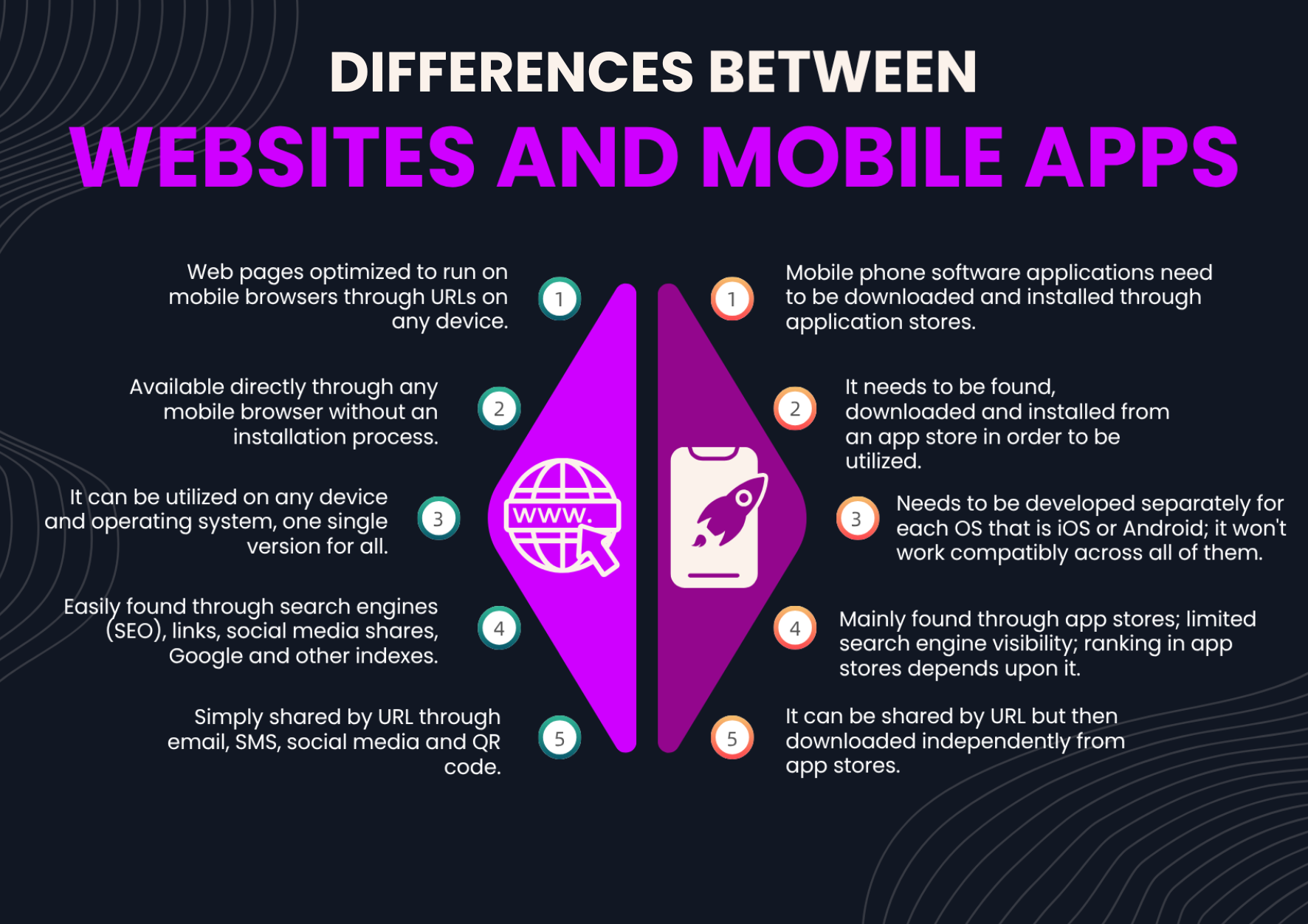Introduction
Are you really aware of the differences between a website and mobile app or still treating them as the same? While both aim to connect users with content and services they still greatly differ in technology, experience and business value. Therefore it is crucial to understand these differences so you can make choices that are congruent with your goals, users and finances.
In this blog, we are going to discover the main differences between mobile apps and websites and the advantages of each. We will also share our industry expertise to help you decide on the most suitable solution for your business.
What is a Website?
A website is a group of publicly available and accessible, hyperlinked web pages that have a common domain name and can be accessed using web browsers on the internet. New websites are usually responsive, that is their layout and functionality are adjusted automatically to provide the best possible experience on different devices like computers, tablets and mobile phones.
Mobile websites are made for small screens with touch-friendly navigation, optimized images and readable text without the need to zoom. They are opened through a URL and do not need to be installed and therefore are available to anyone who has a browser and an internet connection.
What is a Mobile App?
A mobile app is a computer program built for mobile phones like smartphones or tablets. Applications are installed and downloaded from application stores like Google Play Store as well as Apple App Store each developed for a particular operating system like Android or iOS.
Mobile applications utilize capabilities of device hardware and software to provide maximum performance as well as features like push notifications, offline caching, camera usage and location services. They support very interactive user interfaces and gesture support like tap, swipe and pinch and are highly customizable as per users' preferences.
“Choosing between mobile apps and websites isn't about one being better — it’s about what best fits your audience and goals. Apps often excel in engagement and retention, creating personalized experiences that keep users coming back. Websites, on the other hand, offer quick access, broader reach, and lower barriers to entry. The key is understanding where your users are and what they need at each stage of their journey.” says Chris Kulbaba, Business AI-daptation Expert.
This evolution is important to understand as it impacts how websites and apps deliver value and user experience, which we explore next.
Differences Between Websites and Mobile Apps

The following is a detailed table giving the exact differences between mobile and web application in all the important factors:
Differences Between Websites and Mobile Apps
| Aspect | Website | Mobile App |
|---|---|---|
| Description | Web pages optimized to run on mobile browsers through URLs on any device. | Mobile phone software applications need to be downloaded and installed through application stores. |
| Accessibility | Available directly through any mobile browser without an installation process. | It needs to be found, downloaded and installed from an app store in order to be utilized. |
| Compatibility | It can be utilized on any device and operating system, one single version for all. | Needs to be developed separately for each OS that is iOS or Android; it won't work compatibly across all of them. |
| Discoverability | Easily found through search engines (SEO), links, social media shares, Google and other indexes. | Mainly found through app stores; limited search engine visibility; ranking in app stores depends upon it. |
| Shareability | Simply shared by URL through email, SMS, social media and QR code. | It can be shared by URL but then downloaded independently from app stores. |
| Reach | Wider reach with the availability of universal browsers and simple sharing maximizes potential audience. | Limited access to users willing to download; audience restricted to platform and app store visibility. |
| Time & Cost | Quicker and cheaper to make and modify; modifications occur in real-time and are seen by all. | It takes more time and money to create, particularly for multiple sites, and modifications involve user intervention. |
| Support & Maintenance | Easy and cheaper to maintain and modify, modifications go online instantly to all. | Easy and cheaper to maintain and modify, modifications go online instantly to all. Ongoing support and maintenance are more intricate and costly; modifications need to be pushed and deployed. |
Business Benefits of Websites
Websites provide advantages that enable you to reach customers on any device or operating system. They are also less expensive to develop and maintain through a single codebase and instantaneous updates.
- Global Accessibility: Access any user of the internet, no matter the device or operating system.
- Less Development and Maintenance Costs: Single codebase; updates are immediate and do not involve user interaction.
- SEO Advantages: Pages are indexed by search engines and, therefore, more likely to be viewed by more.
- Sharability: URLs are easy to share by means of email, social media, QR codes and others.
- Rapid Deployment: Quick to deploy and iterate; best for MVPs and content businesses.
- No Installation Hurdle: No need for pre-download to view content.
Business Benefits of Mobile Apps
Mobile applications provide unique benefits which can greatly increase user engagement and business performance. Here, we summarize the key benefits that make mobile apps a business powerhouse.
- Rich User Engagement: Permanent device residence, push notification and home screen icons enhance higher retention and engagement.
- Rich Device Integration: Direct access to the device hardware features like camera, GPS, sensors and biometrics provides advanced features.
- Better Performance: Native running allows faster, smoother and more reliable user experiences.
- Offline Access: Applications tend to be able to operate in offline or intermittent connectivity states making them more usable.
- Personalization: Applications can strongly personalize content, notifications and experience according to user behaviour and preference.
- Better Conversion Rates: Applications convert users at far higher rates, on average, than on mobile websites.
- Increased Analytics: Apps can capture more detailed user data, allowing richer behavioural analysis and targeted optimization.
Case Study: Kombee developed a multi-platform web and mobile app for Optima Value Pro, providing real-time project tracking, secure data sync, and streamlined workflows. This dual approach helped Optima improve client interaction and business efficiency, making it an excellent example of how combining both solutions can maximize business results.
Challenges & Concerns by Each Platform
Every platform has its own problems and issues. Below, we detail the primary issues that businesses can encounter when choosing a website or mobile app.
Websites:
Limited exposure to advanced device capabilities, e.g., sensors and push notifications.
Subject to browser support and connectivity.
Perhaps less compelling user experiences than apps.
Mobile Apps:
Increased development and maintenance expenses, particularly for multiple platforms.
Requires regular updates, app store listing and user downloads.
Discovery depends on app store advertising and promotion rather than search engines.
It will introduce friction to first-time users since it needs to be installed.
How to Select: Website or Mobile App?
Deciding and choosing between website vs mobile app is reliant on your business goals and needs. Below are some considerations to help you in determining which platform is ideal for your business.
Use a Website If:
- You need, overall, instant access and findability.
- Your product or service is information-oriented or content-related.
- The budget and timeline are tight.
- Sharability and SEO are essential to your strategy.
Use a Mobile App If:
- You need aggressive device integration and advanced functionality.
- User acquisition, retention, and segmentation are your top concerns.
- Your model depends on repeated frequent visits or in-app monetization.
Hybrid Strategy
Most companies use both a mobile web to onboard and discover and a mobile app for heavy use and enhanced functionality.
Looking to understand app development better? Read our blog on "What’s the Difference Between Native, Hybrid, and Cross-Platform Apps?" to learn how the right approach to development can help you scale and choose the best technology for your needs.
Convergence with Future Trends & New Technologies
As technology keeps advancing, both mobile apps and web development are evolving to catch up with new trends. Here's what emerging technologies are doing to change the future of both.
- Progressive Web Apps (PWAs): PWAs fill the gap with offline enablement, push notifications and browser installability, combining the accessibility of websites with some of the characteristics of apps.
- Cross-Platform Development: New technologies like Flutter and React Native allow the development of multi-platform applications from a single codebase, cutting costs and effort.
- AI & Personalization: Both platforms are embracing AI for intelligent recommendations, chatbots and predictive analysis but applications can leverage device capabilities for real-time computation.
- IoT & Wearables: Applications can directly interface with IoT devices and wearables enabling new business models in the health, fitness and smart home sectors.
- AR/VR: Native applications do offer greater support for augmented and virtual reality programs, which need extensive hardware integration and high performance.
Conclusion
Websites and mobile apps development each have strengths. Websites provide general access, lower cost and greater discoverability, best suited for content distribution and reach. Mobile apps provide enhanced performance, offline capabilities and richer user interaction using native capabilities. It quite literally does come down to your goals, users and feature requirements. Most companies today own both, using websites for exposure and apps for engagement, adopting technologies like PWAs and AI. Don't know where to go with web development or mobile development or both? Kombee is here to guide you to the right digital step.
Frequently Asked Questions
Do I need both a website and a mobile app for my business?
It depends on your business needs. A website is ideal for broad reach and content visibility, while a mobile app offers enhanced user engagement and specific functionalities. Many businesses use both to maximize their digital presence.
Which is more cost-effective: building a website or a mobile app?Building a website is generally more cost-effective than developing a mobile app, especially if targeting a broad audience. Websites are quicker to develop, require less ongoing maintenance, and can reach all users via browsers without installation costs.
How do updates work differently between websites and mobile apps?Website updates are instantaneous and visible to all users once published. Mobile apps require updates to be submitted to app stores, which users must download to apply, leading to delays and additional costs for multiple platform support.
How do websites and mobile apps differ in terms of speed and performance?
Mobile apps usually offer faster performance due to native functionality and direct access to device resources. Websites, while increasingly optimized, can be slower depending on internet connection and browser limitations, though responsive design improves their performance on mobile devices.







